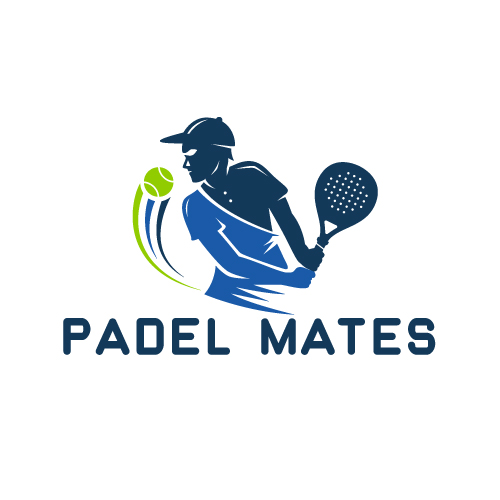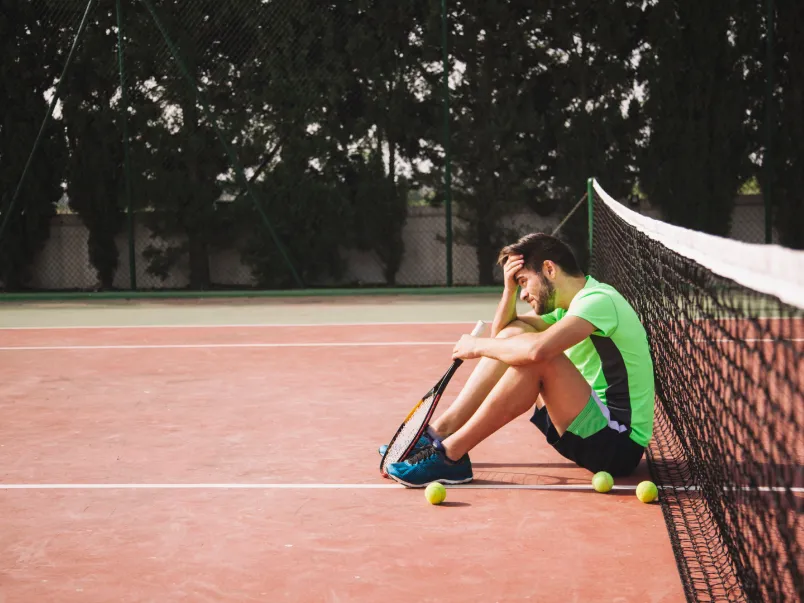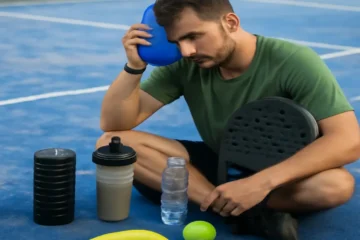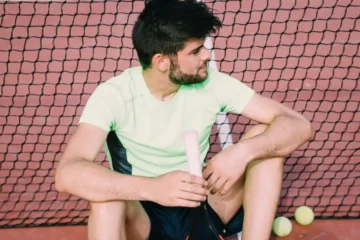More Than Just Smashes and Bandejas
You’ve just won the first set, and you’re leading 5-2 in the second. The match is almost in the bag, but then, you miss an easy volley. Suddenly, everything falls apart. You’re tense, your focus is scattered, and more unforced errors start creeping in. What was once a clear victory is now slipping through your fingers. Sound familiar?
At the amateur level, this scenario happens often. We tend to focus on the technical aspects of the game: our smashes, volleys, and court positioning. But when it comes to professional padel, the game goes beyond just technical skill. Mental toughness is often the key difference between winning and losing, particularly in high-pressure situations. Players who excel mentally can maintain focus, manage pressure, and execute their game plan regardless of what’s happening on the court.
In this article, we’ll break down the mental strategies used by padel pros to maintain composure, stay resilient, and perform consistently under pressure. Whether you’re a beginner or an experienced player, these insights can help you improve your focus and mental fortitude, leading to better on-court performance.
I. The Foundation: What is Mental Toughness in Padel?
Mental toughness is often misunderstood as the absence of pressure or frustration. However, it’s not about avoiding these challenges but rather how you respond to them. In padel, mental toughness refers to your ability to perform at a high level despite the inevitable pressures and frustrations that arise during a match.
Key Pillars of Mental Toughness in Padel:
- Focus & Concentration: The ability to stay present in each moment and focus solely on the point at hand. Padel pros are masters at shutting out distractions and staying locked into the present.
- Emotional Control: In a sport where mistakes are inevitable, being able to manage your emotions—especially frustration, anger, and anxiety—is crucial. Mental strength allows pros to move on from mistakes quickly and refocus.
- Resilience: Resilience is about bouncing back after a tough point or a loss. The best padel players don’t let mistakes or setbacks linger; they recover quickly and keep pushing forward.
- Confidence: Trusting your abilities and believing in your training, especially when faced with difficult situations, is what sets mentally strong players apart from the rest.
II. The Pro’s Playbook: Key Mental Strategies
While physical skills are vital, mental strategies are what give professional padel players an edge in tight situations. Let’s explore some of the key mental techniques they use.
A. Mastering the “Point-by-Point” Mentality
One of the most effective mental strategies in padel is treating each point as a separate event, detached from the previous one. Professionals don’t dwell on past mistakes or let their success from earlier points affect their focus. This is often referred to as the “point-by-point” mentality.
The Pro Technique: Padel pros use rituals to help them reset between points. These rituals could include adjusting their strings, wiping sweat off their face, or taking a deep breath. These actions act as a mental “reset button,” helping them move on from the previous point.
Why it Works: This strategy is effective because it prevents “tilt,” where a single mistake can spiral into a series of errors. By resetting between points, players can avoid the negative emotional feedback loop that often leads to a loss of focus.
B. Taming the Inner Critic: Emotional Regulation
Frustration from unforced errors can be one of the biggest challenges to a player’s mental game. It’s easy to fall into self-criticism, especially when a match isn’t going well. However, mentally tough players understand that self-criticism only undermines their performance.
The Pro Technique:
- Acceptance, Not Judgment: Instead of saying “I’m playing terribly,” pros acknowledge their mistakes without attaching any judgment. For example, they might say, “That was a poor shot” rather than labeling themselves negatively.
- Physical Cues: Controlled breathing techniques, like box breathing (inhaling for 4 seconds, holding for 4 seconds, exhaling for 4 seconds), help lower the heart rate and calm the nervous system. This not only helps players manage stress but also clears their mind for the next point.
- Body Language Management: Even if they feel frustrated, top players maintain strong, confident body language. This signals to their partner and the opponent that they are still in control and ready for the next point.
Why it Works: Managing emotions effectively helps prevent negative emotions from affecting a player’s performance. By focusing on the process rather than criticizing themselves, they stay mentally strong.
C. The Power of Pre-Point Routines
A consistent pre-point routine is another hallmark of mentally tough players. Before each serve or return, pros go through a set of actions and thoughts to help them stay focused and calm.
Breaking it Down: A pro’s routine might include:
- Analyze: A brief moment of tactical analysis (e.g., “Where are my opponents standing? What are their weaknesses?”).
- Visualize: Visualizing the shot and its trajectory helps build confidence and reduces anxiety.
- Execute: After a breath, they focus entirely on executing the point.
The Benefit: This routine reduces overthinking and creates a “bubble of focus,” allowing players to block out distractions and pressure. It also reduces the risk of getting caught up in worrying about the outcome of the point.
D. Strategic Focus: Playing the “Why,” Not Just the “What”
Professional padel players don’t just hit the ball for the sake of hitting it. They play with clear tactical intentions behind every shot. Instead of focusing on the outcome (“Don’t miss!”), they focus on why they’re hitting a shot.
The Pro Technique: Before every shot, they ask themselves, “Why am I hitting this shot?” For example, “I’m hitting this lob deep to the backhand to pull my opponent out of position, which will create an opening for my partner at the net.”
Why it Works: Focusing on the “why” shifts attention from a fear of making a mistake to executing a specific tactic. This shift reduces pressure and enhances performance by focusing on the process rather than the result.
E. The Partnership: Communication and Shared Mental Strength
Padel is a team sport, and the mental strength of one player can affect the entire partnership. Pros understand that mental weakness in one partner can infect the entire pair. That’s why communication and shared mental strength are so crucial.
The Pro Technique:
- Positive Reinforcement: Even during tough moments, pros encourage their partner with simple phrases like “Vamos,” “Good idea,” or “Next one.”
- Constructive Time-Outs: During time-outs, pros focus on discussing tactics rather than assigning blame. They use the time to refocus and recalibrate their strategies.
- Shared Responsibility: The mindset is that “we’re in this together.” Whether they win or lose, they share the responsibility for both good and bad moments on court.
Why it Works: Positive reinforcement helps build a supportive and resilient team environment. By sharing the mental load, partners can stay focused and maintain morale, even during tough moments.
III. Training Your Mental Game: Drills and Exercises
Now that you know the strategies pros use, it’s time to apply them in your own training. Here are a few drills and exercises that will help you build your mental toughness:
The “No Excuses” Drill
In this drill, you play a practice match where you are not allowed to show any negative emotion or verbalize your mistakes. Instead, focus on the next point, no matter what happens. This drill helps break the habit of self-criticism and encourages you to stay in the present moment.
The “Three-Second” Reset
After each point, you have only three seconds to physically reset. This could mean turning around, taking a deep breath, or tapping the glass. The goal is to reset mentally and prepare yourself for the next point quickly.
Post-Match Analysis (The Good & The Bad)
After every match, take a few minutes to write down three things you did well mentally and one thing to improve next time. This exercise will help you recognize your mental strengths and areas for growth, making it easier to refine your mental game over time.
Conclusion: Your Mind is Your Most Powerful Weapon
Mental toughness isn’t just a trait you’re born with—it’s a skill you can develop. By implementing strategies like the point-by-point mentality, emotional regulation, tactical focus, and strong team communication, you can enhance your mental game and become a more resilient and focused player.
The next time you step onto the court, remember that while your opponent can attack your shots, they can’t break your focus unless you allow them to. Mastering your mind is the key to unlocking your full potential as a padel player. Your mental game is your most powerful weapon—use it wisely!
FAQs
1. What is mental toughness in padel?
Mental toughness in padel refers to the ability to perform optimally under pressure, manage frustrations, maintain focus, and stay confident despite challenges. It involves emotional control, resilience, and mental strength to stay consistent throughout a match.
2. How can I improve my focus on the padel court?
To improve your focus, try adopting a “point-by-point” mentality. Focus on each point separately, reset after every point with rituals like adjusting your strings or taking deep breaths, and avoid dwelling on previous mistakes or successes.
3. What is the “point-by-point” mentality in padel?
The “point-by-point” mentality involves treating each point as a new event, disconnected from the previous one. This prevents mistakes from snowballing and helps players stay focused on the present moment instead of the past.
4. How do professional padel players manage emotions during a match?
Professional players manage their emotions by practicing emotional regulation techniques such as controlled breathing, maintaining positive body language, and reframing mistakes with a mindset of acceptance rather than self-criticism.
5. What is the role of body language in mental toughness for padel players?
Body language plays a crucial role in mental toughness. Professional players use strong, confident body language to convey positivity and resilience, even during tough moments. This helps maintain focus, boost morale, and influence both their partner and opponent.
6. How can I reset mentally after a mistake in padel?
To reset after a mistake, take a brief pause (e.g., three seconds), breathe deeply, and refocus on the next point. Use physical cues like turning around or tapping the glass to break the negative emotional cycle and regain composure.
7. How can I improve my mental game during padel practice?
Incorporate drills like the “No Excuses” drill, where you focus on staying positive and present during practice matches, or the “Three-Second Reset” to help you recover quickly after every point. Regular post-match analysis will also help you recognize mental strengths and areas for improvement.
8. Why is communication important in a padel team?
Effective communication between partners is essential for maintaining a strong mental game. Encouraging words, constructive time-outs, and shared responsibility for both wins and losses help create a supportive environment, keeping both players mentally strong throughout the match.




